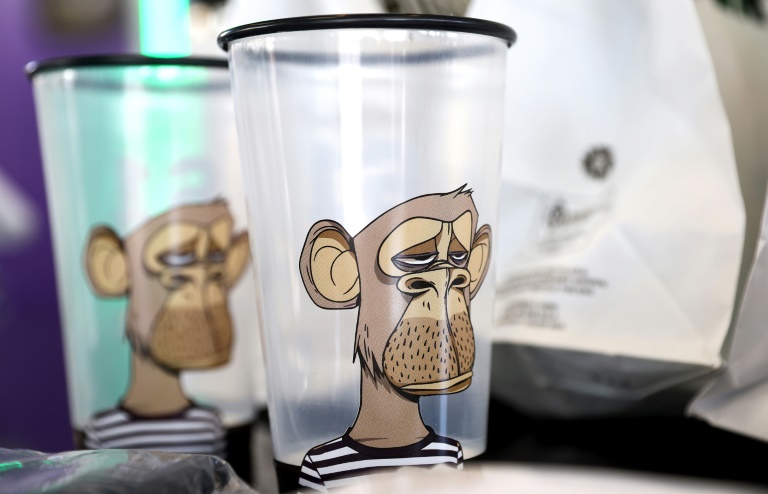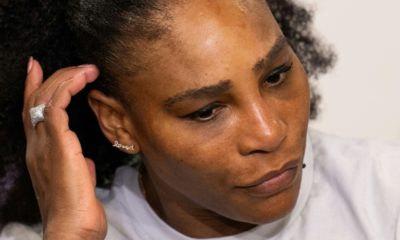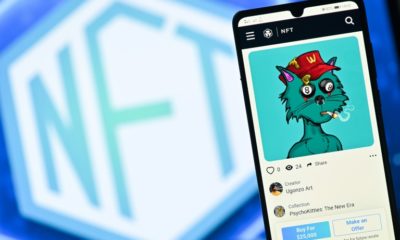With a blast of “Break on Through” by The Doors and a flashy video of cartoon apes careening around a fantasy landscape, the boss of one of crypto’s most secretive companies took to the stage on Thursday.
Nicole Muniz, CEO of Yuga Labs, had a tough mission at the Web Summit tech conference in Lisbon –- to explain what exactly the “Bored Ape Yacht Club” (BAYC) offers the world.
BAYC is a set of 10,000 auto-generated images of cartoon apes sporting various expressions and accessories, with a back story about them living in a swamp.
Enthusiasts have shelled out many millions in trading the images, which come in the form of digital tokens known as NFTs.
Celebrity owners range from Justin Bieber to Madonna and Gwyneth Paltrow.
But Muniz was keen from the off to sketch out a wider concept of the company, tying it to “web3” –- an imagined future for the internet that has cryptocurrencies at its heart.
“We need to be thinking about how we can help onboard the next 100 million people into web3,” she told the audience.
“That’s really a true mission for us in this company.”
Her wider focus was unsurprising as interest in NFTs has dropped off a cliff.
Trading volumes crashed by 97 percent between January and September, according to Dune Analytics.
Yet Yuga Labs has a notional value of $4 billion and its apes are among only a handful of NFTs that still sell -– one fetched $450,000 last week.
– NFT ‘community’ –
The company has been an enigma since it burst on to the scene last year.
Its founders tried to stay anonymous but BuzzFeed News revealed their identities in February.
The Web Summit was supposed to play host to Muniz and co-founder Greg Solano in one of their most high-profile public appearances.
But he pulled out just a couple of hours before his talk.
“Hey Lisbon Apes, not feeling well at all and need to skip my panel at WebSummit today,” he tweeted.
“Glad I got to meet so many of you last night though.”
Ironically, it was this sense of “community” in the real world that was flagged by Muniz as one of the secrets of BAYC’s success.
“I was talking to an ape last night and they were talking about being at ApeFest,” she said, referring to meet-ups the fans host in New York.
“You’re living and breathing these communities. These people are your friends.”
– ‘Unclear’ licences –
Yet on the face of it, the conceptual framework of Muniz’s pitch is the same as almost every other NFT project.
She talked of community, promised a big new multi-player game and envisaged a world where NFTs would somehow be the keys to a magical online world.
“We have a vision of a future where people can own these assets –- whether they’re NFTs or digital collectibles, whatever you want to call them,” she said.
“You can take them where you want, you can build on them and monetise.”
She claimed BAYC was unique in offering owners full intellectual property rights to do whatever they like with their NFTs and cited the Bored & Hungry restaurant chain, which has an ape on its logo.
But a recent report by the specialist website Galaxy.com said BAYC’s licensing agreement did not give the buyers any IP ownership, describing the terms as “unclear and potentially misleading”.
The authors speculated that high-profile ape-related projects had probably negotiated separate deals.
Muniz said ultimately it was her mission to make it easier for people to understand “web3” and enter its world.
But even the title of her talk — “NFTs, metaverses and the road to Web3 Disney” — was no clearer at the end than it had been at the start.

 Business4 months ago
Business4 months ago
 Business5 months ago
Business5 months ago
 Events3 months ago
Events3 months ago
 People4 months ago
People4 months ago
 Events6 months ago
Events6 months ago










